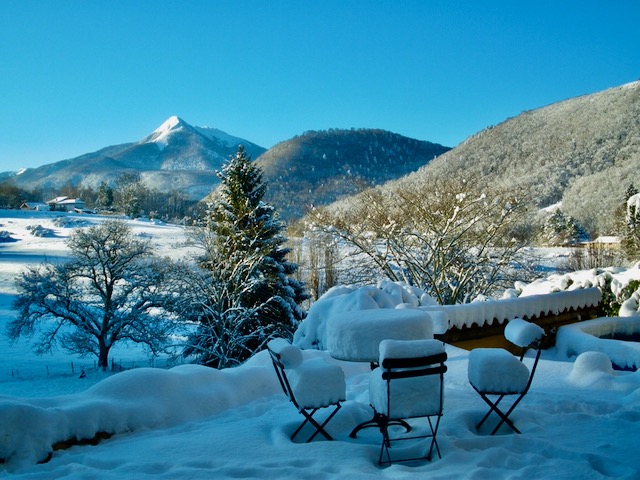I love the fact that every European country has its own Christmas traditions and, having lived in France now for almost 20 years, we tend to have a hybrid Christmas adopting and adapting our favourite traditions from the UK and France and throwing in a few of our own as well.
Christmas in France is quite low-key (compared to the UK and the US) and, unsurprisingly, is centred around food and drink shared with family. Each region has its specialities but nearly everywhere, seafood plays a large part, particularly oysters, smoked salmon, and scallops. For the main course, although turkey has become popular for the Christmas meal, many families still enjoy the more traditional chapon (castrated chicken!) Pudding is usually a Bûche de Noël in one of its many guises and, of course, the traditional coupe de champagne (or some sort of sparkling like the Cremant de Limoux from this part of the world) is almost always served. Vin chaud is also very popular during the run up to Christmas, especially at the Christmas markets, on café terraces and in the ski resorts.
The Christmas meal in France takes place on the 24th of December, which is known as the Réveillon de Noël and the eating and drinking goes on for many hours. And instead of hanging stockings by the fireplace for Père Noël, the children leave slippers, often with a small gift of food inside. Father Christmas will always reply to any letter in France; you just address your envelope to Père Noël making sure to give your address and he will reply (this French Father Christmas lives in Libourne, near Bordeaux).
Surprisingly for a Catholic country, church attendance is not widespread at Christmas but there is a big emphasis in every commune on the Crèche which, as well as the usual suspects, also features santons (wooden figures) representing the local population. So often there will be a postman and a butcher, some farmers, and peasants and, in our part of the world rather controversially, often a bear (they used to be indigenous in the Pyrénées and have been reintroduced against the wishes of many local farmers). You won’t see Jesus himself until after midnight on the 24th because he is placed ceremonially in the crib in time for midnight mass.
The Boxing Day bank holiday doesn’t exist in France, so it is straight back to work on the 26th for most people; one tradition that we have not adopted! Usually it is warm and sunny in our part of France over Christmas and New Year (we nearly always have our Christmas apèro outside on the terrace) so we head off for a walk in foothills or up to the mountains if we want to find some snow.
Christmas officially comes to an end at Epiphany (6th January) which celebrates the arrival of the Three Kings. This is recognized by the serving of the Galette de Roi (cake of the kings), typically made of pastry and marzipan and which includes a fève (literally a bean but, nowadays, a charm or figurine) that one lucky recipient will find in their slice (hopefully before they break their teeth on it) and will be crowned king or queen for the day.
However, you celebrate Christmas, I wish you a very bonnes fêtes and I look forward to helping you with your French property search in 2023: nadia@foothillsoffrance.com






You must be logged in to post a comment.